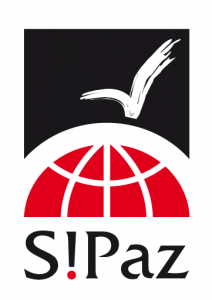We need your support. Your contribution makes it possible for SIPAZ to continue offering international accompaniment in the regions of Chiapas, Oaxaca and Guerrero.

International Service for Peace
What is SIPAZ?
Creation
In 1994, after the armed uprising by the Zapatista Army of National Liberation (EZLN), social and civil organizations, as well as Mexican religious leaders, recognized the need for a permanent international presence in Chiapas to help to avoid or lessen the risks of violent ends to conflict. In this context, in 1995, a group of international organizations with a long history of work in the areas of peace building, human rights, and nonviolent activism responded by creating a coalition consisting of members from the United States, Europe, and Latin America. They shared not only concerns about the situation in Chiapas, but also the hope that they could help to build a just, long-lasting peace in the state. From this came the project of SIPAZ, the International Service for Peace.
Mission
As an international non-profit organization with a permanent presence in Mexico, SIPAZ works towards the deterrence and prevention of socio-political violence, the positive transformation of conflicts, and respect for human rights in Chiapas and, as much as possible, in Oaxaca and Guerrero.
Values that inform our way of action
SIPAZ has an international character
We are an organization that mobilizes from the concerns of the international community regarding the situation of violence, conflict, and human rights abuses in Mexico, and the need for peace and social justice.
SIPAZ is based on a non-violence approach
Acting in a peaceful and proactive manner, respecting and promoting the dignity of people, human rights, the right to self-determination of peoples, equity, interculturality, justice and diversity in all its expressions, without distinction of religion, gender, ethnicity and political or sexual preference.
SIPAZ is politically independent
We recognize and respect the principles of non-intervention and sovereignty of the Mexican State and its citizens, on whom the initiative must depend to reach a solution to existing socio-political conflicts. Although we cannot be neutral or passive when it comes to human rights violations, we recognize that any real solution requires the participation of everybody involved as agents of change.
Objectives of our work
- To protect and expand the spaces of action for organized social groups in defense of human rights and towards the construction of positive peace.
- To inform and equip national and international stakeholders to carry out diplomatic actions for peace in Southern Mexico.
- To promote spaces of exchange and networking towards the defense of human rights and the construction of a culture of peace.
- To maintain relationships that allow appropriate support, aimed at expanding the scope of action of organized local groups in the defense of human rights and towards the construction of positive peace.
- To inform and empower grassroots actors to strengthen non-violent actions to defend their rights and to promote a culture of peace.
Areas of our work
In countries where governments are concerned with projecting a positive image regarding human rights, the international observer presence -in sites and moments of high tension or conflict- has a deterrent effect against the possible use of violence. The observer presence increases the political costs of such violence. This dynamic of protection opens political spaces for local human rights defenders, indigenous organizations, social sectors, rural communities, and civil society groups who suffer repression because of their work. By feeling accompanied, these actors -including groups of men and women- have less fear in filing complaints concerning human rights violations to which they are subjected, and feel empowered to organize more proactively.
The presence of SIPAZ in Chiapas can be seen in different forms:
- Community field trips and/or participation in Observation Brigades conducted jointly with other organizations, in order to maintain a protective presence in emergency situations and/or to document possible human rights violations.
- Accompaniment of non-violent actions carried out by social groups organized in defense of human rights and positive peace.
- If deemed appropriate after conducting risk assessments, protective accompaniment to threatened individuals or organizations.
- Regular visits or field trips to meet with social and political actors present in work zones.
- Relationship building that allows appropriate support, aimed at expanding the scope of action of organized local groups.
- Participation in meetings to analyze socio-political conflicts or cases of human rights violations that occur in work zones.
Since 2005, SIPAZ has expand its work into the states of Oaxaca and Guerrero, where the same structural conditions that provoked the EZLN uprising in Chiapas are found: social, political, and economic marginalization, discrimination and racism wrought by centuries of internal and external colonialism, and repression and violations of human rights. We do not maintain permanent offices in either of these regions, but we carry out long-term excursions three to four times per year in each state which informs our work.
The work of SIPAZ has two main functions:
- Making visible the patterns of social and political conflicts and human rights violations, and outlining alternatives in which local, national, and international actors and institutions can interact to transform conflicts through non-violence and dialogue. Besides limiting direct violence by exposing the causes and consequences of conflicts, we also wish to focus a spotlight on actors and initiatives that represent positive alternatives and reasons for hope in the region.
- Informing and training grassroots actors about social and political conflicts and current processes of grass-roots organizing. The goal is to encourage peace-building initiatives, reduce tensions, and support grassroots actors in developing effective strategies of thier own to reduce local conflict.
We operate several publications: a quarterly newsletter (distributed in four languages – Spanish, English, French, and German, with a print version in Spanish and English), a website (also in these four languages, where everything published by SIPAZ since its creation is archived and accessible), a blog (in Spanish and English, with flash-news information), and Urgent Actions and Bulletins (in all four languages).
In order to inform national and international stakeholders to carry out diplomacy for peace in Southern Mexico, SIPAZ has been developing public relations with Mexican authorities at all levels as well as with Embassies and multilateral organizations. We also offer information and analysis to delegations and individuals who visit our office in Chiapas. From time to time, we organize tours, mainly for groups from Europe and the United States.
SIPAZ has also developed analysis workshops in order for grassroots actors to strengthen their strategic refllection, as well as workshops on active nonviolence, conflict transformation, peace, and reconciliation.
SIPAZ actively maintains contacts and dialogue with a wide range of organizations, movements, and networks in Mexico and other countries that are engaged in processes of peace-building and/or are interested in similar issues.
SIPAZ also participates in forums and other spaces of information exchange, analysis, and dialogue regarding promotion of cultures of peace. For instance, we actively participate in:
AT A NATIONAL LEVEL :
- Slamalil Kinal, a space for analysis, reflection and action made up of 10 civil organizations and the Vicariate of Justice and Peace that maintains a permanent analysis of the local and national context, with specific actions such as training on risk, security and protection as well as psycho-social coping; as well a in peace building with young people; pronouncements in the face of serious events, or meetings of around 30 social and civil organizations.
- Together with Mesoamerican Voices - Action with Migrant Peoples and Huridocs, we have developed the project "Strengthening the self-protection capacities of human rights organizations and communities in Chiapas" in which a dozen civil organizations working in Chiapas participate. We have jointly developed tools for information recording, systematization and analysis to promote a multi-stakeholder dialogue for advocacy processes, allowing positive impacts to be generated at the local, national and regional levels.
- RAMAT, the Support Network for Mother Earth (RAMAT) composed of different organizations that implement training activities in the pastoral regions of the San Cristóbal de Las Casas Diocese.
- Espacio Seguridad San Cristóbal: A space for analysis and training of civil society organizations based in San Cristóbal de Las Casas with an emphasis on risk analysis and training on issues related to security and protection.
AT AN INTERNATIONAL LEVEL
- People's Movement for Peace and Justice (MPPJ), a binational Mexico-United States platform.
- GPPAC (Global Partnership for the Prevention of Armed Conflict), a global initiative of civil society organizations seeking to build international consensus about the urgent need for peace and the prevention of violent conflicts.
- Mexico-European Union Platform for Peace and Human Rights: in which organizations from Mexico and the European Union and seek to strengthen analysis, reflection and feedback on advocacy strategies to advance the human rights agenda in Mexico.
- The Community of Practice of Unarmed Civilians – Protection/Accompaniment (CofP) is a dynamic network of organizations and individuals evolving together to create effective, community-centered, and nonviolent ways for civil and community protection as well as violence prevention.

